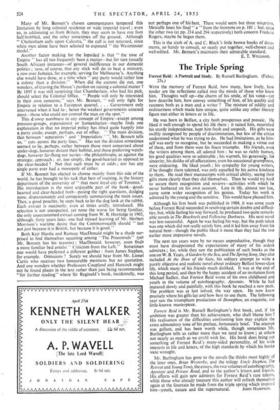The Triple Spring
WITH the memory of Forrest Reid, how many, how lively, how tender are the reflections called into the minds of those who knew him. Thoughts well up—the charm of his smile, of his voice—yet how describe him, how convey something of him, of his quality and rareness both as a man and a writer ? The mixture of oddity and ordinariness which made him unique, quite unlike any other literary figure met either in letters or in life.
He was born in Belfast, a city both prosperous and prosaic. He liked it well enough to spend his life there ; it suited him, nourished his sturdy independence, kept him fresh and unspoilt. His gifts were swiftly recognised by people of discrimination, but few of the critics understood what he was trying to do. He had limitations, as he him- self was early to recognise, but he succeeded in making a virtue out of these, and from them won his finest triumphs. His friends, even the writers among them, all adored him ; he was so richly human, his good qualities were so admirable ; his warmth, his generosity, his sincerity, his dislike of all affectations, even his occasional grumpiness, were endearing. He liked youth ; his sympathy for young writers, if he thought them talented, was only equalled by his active kindness to them. He read their manuscripts with critical ability, seeing their gifts more clearly than they did themselves. Then he would try hard to secure them recognition and reviews—activities with which he never bothered on his own account. Late in life, almost too late, came some wider recognition of his genius. Today his work is admired by the young and the sensitive. This would have pleased him.
Although his first book was published in 1904, it was some years before Forrest Reid succeeded in resolving certain doubts and difficul- ties, but, while feeling his way forward, he produced two quite remark- able novels in The Bracknels and Following Darkness. His next novel was less successful. Again he was feeling his way, but the path taken was one which did not really satisfy him, and it led him away from his natural bent—though the public liked it more than they had the two earlier more impressive novels.
The next ten years were by no means unproductive, though they must have disappointed the expectations of many of his ardent admirers ; for, while they saw the publication of such books as the one on W. B. Yeats, A Garden by the Sea, and The Spring Song, they also included At the Door of the Gate, his solitary attempt to write a purely objective and realistic novel about ordinary Belfast lower-class life, which many of his friends much 'disliked. It was at the end of this long period, and then by the happy accident of an invitation from Michael Sadleir, that Forrest Reid wrote of his own childhood and youth in the volume of autobiography, Apostate. While he had matured slowly and painfully, with this book he reached a new peak. The problem was at last solved, the way open. He now knew precisely where his gifts lay and how best to use them. The following year saw the triumphant production of Demophon, an exquisite, too little-known masterpiece.
Forrest Reid is Mr. Russell Burlingham's first book, and, if his ambition was greater than his achievement, who shall blame him ? His realisation of the difficulties confronting him may explain the cross admonitory tone of his preface, fortunately brief. The attempt was gallant, and has been worth while, though sometimes Mr. Burlingham tells us rather more than we need to know ; at others not nearly as much as we could wish for. His book does bring out something of Forrest Reid's many-sided personality, of his wide interests in life and letters, of the high standards by which his books were wrought.
Mr. Burlingham has gone to the novels (he thinks most highly of the later ones, Brian Westerby, and the trilogy Uncle Stephen, The Retreat and Young Tom), the essays, the two volumes of autobiography, Apostate and Private Road, and to the author's letters and friends. His efforts will gain new admirers for Forrest Reid's rare talents, while those who already treasure this author will refresh themselves again at the fountain he made from the triple spring which inspired him—youth, nature and the supernatural. JOHN HAMPSON.


































 Previous page
Previous page